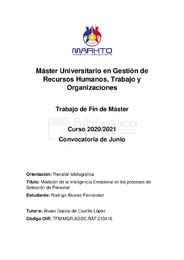Please use this identifier to cite or link to this item:
https://hdl.handle.net/11000/25866Full metadata record
| DC Field | Value | Language |
|---|---|---|
| dc.contributor.advisor | García del Castillo López, Álvaro | - |
| dc.contributor.author | Álvarez Fernández, Rodrigo | - |
| dc.contributor.other | Departamentos de la UMH::Ciencias Sociales y Humanas | es_ES |
| dc.date.accessioned | 2022-02-11T11:18:36Z | - |
| dc.date.available | 2022-02-11T11:18:36Z | - |
| dc.date.created | 2021-06-13 | - |
| dc.identifier.uri | http://hdl.handle.net/11000/25866 | - |
| dc.description.abstract | Una medición precisa de la IE parece ser especialmente útil para los contextos de selección de personal de las organizaciones. El objetivo de esta revisión bibliográfica es identificar aquellos instrumentos más relevantes y/o con mejores resultados para su aplicación en el contexto organizacional, centrándonos en el ámbito de la Selección de Personal, según su frecuencia de aparición en la literatura científica. Para llevar a cabo la investigación se han utilizado la base de datos Scopus y la base de datos Web Of Science (WOS) y una vez hecha la criba según los criterios de inclusión y exclusión marcados se han seleccionado 18 artículos. Los resultados muestran que los instrumentos más relevantes a la hora de medir la IE en contextos de selección personal son el Wong's and Lee Emotional Intelligence Scale (WLEIS) y Mayer-Salovey-Caruso Emotional Intelligence Test (MSCEIT), seguidos por el Trait Emotional Intelligence Questionnaire (TEIQue), el Trait Meta-Mood Scale (TMMS) y el Schutte Self-Report Emotional Intelligence Test (SSEIT). Si nos centramos en la clasificación inicial aquellos instrumentos más utilizados son los que se basan en una metodología autoinformada (14) frente al resto (6). Cabe destacar, por último, que estos instrumento son aplicados en diferentes contextos laborales, principalmente para predecir el futuro desempeño laboral. | es_ES |
| dc.description.abstract | An accurate measurement of EI appears to be especially helpful in organizational recruitment contexts. The objective of this bibliographic review is to identify those instruments that are most relevant and / or with the best results for their application in the organizational context, focusing on the field of Personnel Selection, according to their frequency of appearance in the scientific literature. To carry out the research, the Scopus database and the Web Of Science (WOS) database were used, and once the screening was done according to the marked inclusion and exclusion criteria, 18 articles were selected. The results show that the most relevant instruments when measuring EI in personal selection contexts are the Wong's and Lee Emotional Intelligence Scale (WLEIS) and the Mayer-Salovey-Caruso Emotional Intelligence Test (MSCEIT), followed by the Trait Emotional Intelligence Questionnaire (TEIQue), the Trait Meta-Mood Scale (TMMS) and the Schutte Self-Report Emotional Intelligence Test (SSEIT). If we focus on the initial classification, those instruments most used are those based on a self-reported methodology (14) compared to the rest (6). Finally, it should be noted that these instruments are applied in different work contexts, mainly to predict future work performance. | es_ES |
| dc.format | application/pdf | es_ES |
| dc.format.extent | 20 | es_ES |
| dc.language.iso | spa | es_ES |
| dc.publisher | Universidad Miguel Hernández de Elche | es_ES |
| dc.rights | info:eu-repo/semantics/openAccess | es_ES |
| dc.rights | Attribution-NonCommercial-NoDerivatives 4.0 Internacional | * |
| dc.rights.uri | http://creativecommons.org/licenses/by-nc-nd/4.0/ | * |
| dc.subject | Inteligencia emocional | es_ES |
| dc.subject | Selección | es_ES |
| dc.subject | Personal | es_ES |
| dc.subject.other | CDU::3 - Ciencias sociales::33 - Economía::331 - Trabajo. Relaciones laborales. Ocupación. Organización del trabajo | es_ES |
| dc.title | Medición de la Inteligencia Emocional en los procesos de Selección de Personal | es_ES |
| dc.type | info:eu-repo/semantics/masterThesis | es_ES |

View/Open:
TFM Alvarez Fernandez Rodrigo.pdf
524,27 kB
Adobe PDF
Share:
.png)
